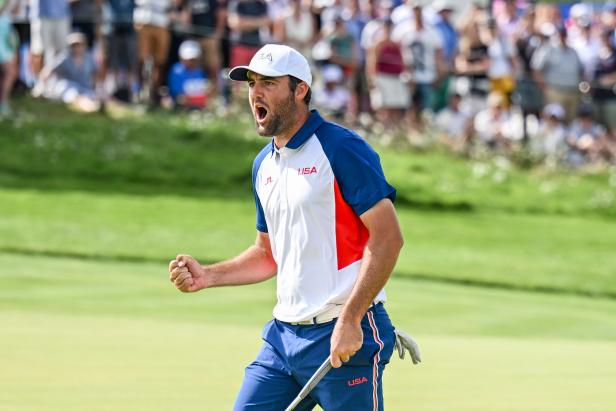Scottie Scheffler’s back-nine 29 to earn a gold medal instantly puts him on a list of American Olympic legends – Australian Golf Digest

- by Admin
- August 4, 2024

[PHOTO: Keyur Khamar]
Billy Mills from half-a-lap down in the 10,000 metres at the 1964 Olympics in Tokyo. Dave Wottle’s ridiculous sprint from dead last in the 800 metres to win gold on the track in Munich in 1972. Jason Lezak’s closing 50 metres to win the 400-metre freestyle swim relay gold for the US and Michael Phelps at the Beijing Games in 2008. And now add one more to the list of remarkable American closing kicks to win gold in the Olympics.
Scottie Scheffler can stand equal with those historic American heroes (and any others you care to name) after his back-nine 29 and course-record-tying 62 at Le Golf National snatched the gold medal from a collection of the best players in the world in the best Olympic men’s golf field ever. Tommy Fleetwood was a shot behind and earned the silver medal. Hideki Matsuyama shot a final-round 65 to finish third and take home bronze.
Jason Day, Australia’s best hope starting the final round, shared ninth place after a closing 68. His fellow Australian, Min Woo Lee, capped off his inspiring comeback from a shocker opening round 76 with a 65-68-68 finish to post a seven-under total. Lee tied for 22nd.
It was vintage Scheffler, who entered the final round four shots off the lead of Jon Rahm and Xander Schauffele, and despite a three-under front nine found himself seven behind Rahm’s midway final-round lead, where he surged to 20-under at one point before collapsing with four bogeys and a double on his back nine.
Scheffler, the clear No.1 player in the world after his seventh victory of the year, made six birdies on the back nine, including four in a row from holes 14 through 17. It was clinical and clockwork and relentless, the way Scheffler had played his entire year, when he played his best, and even it left him more than a bit overwhelmed, breaking down into tears as the final words of the US national anthem played with him occupying the top spot on the medal stand.
“Mostly we were just trying to stay patient,” Scheffler said in that familiar tone that makes it sound like he’s taking out the garbage when what he’s really doing is landing a fighter jet on an aircraft carrier in a typhoon. “When I saw that Rahm had gotten to 20, I kind of changed a little bit mentally to just really try to do my best to move my way up the leaderboard. I didn’t even really know if I was in contention or not. I was just trying to do my best to make some birdies and start moving up and maybe get a medal or something like that. And I was fortunate to execute some shots there down the stretch.”
Scheffler’s humility can be as incredulous as it is infectious. Only the No.1 player in the world who casually leads the PGA Tour in 33 statistical categories could honestly say he couldn’t make sense out of the electronic leaderboards at Le Golf National, and you believe him. Just playing some golf, making some birdies, talking with my mates.
Pretty good for a guy who by the middle of the week confessed he couldn’t read the greens at Le Golf National, a venue that emerged as a fitting stage for raucous crowds and even louder golf.
Indeed, Scheffler’s win, combined with daily attendance that reached bizarre numbers of 20,000 or more, routinely serenading individual players like it was a soccer game or rock concert or both gives a kind of seal of approval to Olympic golf. Golf in the games might just have found a kind of notch above regular weeks despite a traditional 72-hole format that some have characterised as boring and run-of-the-mill. It was anything but for Scheffler, and even for those who didn’t win a medal, like Rahm, who seemed in command through the front nine of the final round before the back-nine 39, said the mistakes were hard to take, but not as much as disappointing his country.
“It’s not like it was terrible,” Rahm said, who went from gold to a tie for fifth after a 72nd-hole bogey. “The three-putt situation has been an issue the whole week. The main mistake is the third shot on 14. I can’t do what I did on the third shot. Can’t go left. Ended up paying the price for compounding mistakes on that hole. “I don’t remember the last time I played a tournament and I felt this – I don’t know what the word is – because I not only feel like I let myself down but also to just not get it done for the whole country of Spain. It’s a lot more painful than I would like it to be. I’ve gotten the question, where this tournament would rank in my opinion or what I would think it would feel like to win, and I think by losing today, I’m getting a much deeper appreciation of what this tournament means to me than if I had won any medal. I’m getting a taste of how much it really mattered.”
Scheffler, whose picture is likely in some dictionaries under the entry for “self-effacing”, strongly credited caddie Ted Scott. Scott’s experience as Bubba Watson’s caddie during the US team’s appearance at Le Golf National for the 2018 Ryder Cup gave Scheffler a valuable set of eyes on the greens the best player in golf confessed he really couldn’t read. Scott reset Scheffler’s eyes after he started his second round with an outward two-over 38. He played his final 45 holes at Le Golf National in 17-under.
“I felt like I was doing a lot of things well, and I wasn’t getting a lot out of it,” Scheffler said of the middle of his final round when he made six pars in a row after starting with three birdies. “I was just watching great players fly up the leaderboard, and I feel like they’re getting further and further away from me.
“And, you know, once again, I always go back to Teddy because he does a really good job of making sure that I’m in the right head space to where I can stay there and be committed to the shot. This week was definitely one of those weeks.”

Scheffler wasn’t ready to rank this win in a different place in his career, but in a lot of ways it was similar to what he’s done when he’s played his very best and yet it stands on its own, too.
“I don’t think too much about my legacy as a golfer,” he said, waving aside self-importance while self-consciously adjusting the gold medal around his neck the way a teenager might play around with an uncomfortable necktie. “That’s not really something that comes to mind. I love being out here competing. It’s one of my favourite things in the world to do and it’s a great joy in my life. It’s something that I work very hard at. I’m proud to be sitting here with a gold medal. I’m just out here competing and trying to stay present and working as hard as I can and trying to get the most out of myself.
He might not think about legacy. But Scheffler, the Olympian, made his own bit of US Olympic history in Paris. Right up there with the greats. It was a different, but uniquely elevated place. Like the top of a podium.
Or in Scheffler’s case, the same as he ever was.
The Latest News
-
January 9, 2025‘No pressure’ for Tsitsipas after rankings slide, surprise split
-
January 9, 2025Cleveland New Releases for 2025 – Australian Golf Digest
-
January 9, 2025’Never told anybody’: Djoker makes sensational claim he was ‘poisoned’ in Australia
-
January 9, 2025Australian Open 2025: Everything you need to know
-
January 9, 2025Djokovic claims he was ‘poisoned’ during COVID detention in Melbourne





